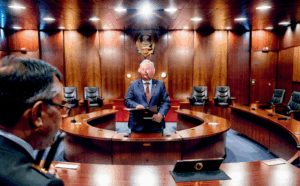A worrying trend has emerged in Perth and Kinross, as local elected representatives express deep concern over alleged threats of disciplinary action for publicly critiquing senior figures within their local council. Councillors fear that such intimidation tactics are severely impeding their fundamental duty to hold administrative officials accountable for decisions and performance affecting the community.
These serious allegations come at a time when there is a growing public demand for greater transparency and robust oversight from those leading local government operations. Residents of Perth and Kinross rely on their elected councillors to be vigilant watchdogs, ensuring that the local authority serves the public interest effectively and with full transparency. However, a prevailing sense of caution, or even fear, among councillors suggests that this crucial democratic function is being undermined.
At the heart of the issue lies a specific provision within the national code of conduct governing councillors across Scotland. This particular clause, intended to maintain professional decorum, stipulates: *“I will not undermine any individual employee or group of employees, or raise concerns about their performance, conduct or capability in public.”*
While designed to prevent unwarranted personal attacks, numerous councillors contend that this very rule is frequently weaponised to silence legitimate inquiry and criticism of official work. They report instances where council officers have explicitly warned them of potential referrals to the Standards Commissioner should they dare to question administrative decisions or the execution of duties in public forums like council meetings or public statements. A Culture of Restraint?
This atmosphere of perceived threat is not isolated. Councillors from various political affiliations – including both governing and opposition parties – and from different local authorities in the region, including Perth and Kinross, have independently come forward with similar accounts. They describe it as a pervasive ‘culture’ across Scottish local government, where the fear of formal reprimand stifles open debate and critical assessment.
This broad concern suggests a systemic issue, potentially affecting the integrity of local democratic processes. If elected representatives feel muzzled, it raises significant questions about who truly holds power and who truly speaks for the community on vital matters like local services, infrastructure projects in the Fair City, or budgetary allocations impacting Perthshire villages. MSP Backs Councillors’ Claims
The concerns raised by these local politicians have found resonance at a national level. Murdo Fraser, a Member of the Scottish Parliament for Mid Scotland and Fife, has publicly acknowledged that he has received similar reports directly from councillors in the region. He did not mince words, describing the situation as “ridiculous and undemocratic,” stressing that elected individuals should never feel apprehensive about articulating public concerns due to restrictive interpretations of conduct rules.
Fraser further revealed that he had previously engaged with the Standards Commissioner in Holyrood regarding opposition councillors facing threats for questioning council decisions. He noted: *“She agreed with me that it was an issue and that such behaviour was not acceptable.”* This external validation from a high-profile figure underscores the gravity of the councillors’ claims and highlights the chilling effect these threats have on legitimate political discourse and holding power to account within local governance. The Standards Commissioner’s Perspective
The code of conduct itself is a document drafted by Scottish Ministers and subsequently approved by the Scottish Parliament. When a complaint is made, it is initially investigated by the Ethical Standards Commissioner, an independent body, before being forwarded for a final determination.
Responding to the wider debate, a spokesperson for the Standards Commissioner reiterated their stance on the matter: *“Councillors should be able to undertake their scrutiny role effectively, without making personal criticism of the conduct, performance or capability of individual officers.”*
However, the spokesperson also offered a pathway for councillors to voice concerns without falling foul of the code, stating: *“Councillors are, of course, also entitled to raise concerns privately with the chief executive or any other appropriate senior officer.”*
This suggests that while public criticism of individual officers might fall outside the code’s acceptable parameters, private channels for robust scrutiny are expected to remain open. However, the experiences shared by councillors in Perth and Kinross indicate a disconnect between this official guidance and the practical realities they face in their daily roles.
The ongoing dialogue between elected members and regulatory bodies highlights a critical tension within local governance: how to balance the need for professional conduct and respect within the council with the essential democratic imperative for transparency, accountability, and the ability of elected representatives to speak freely on behalf of their constituents in Perth and Kinross.
These serious allegations come at a time when there is a growing public demand for greater transparency and robust oversight from those leading local government operations. Residents of Perth and Kinross rely on their elected councillors to be vigilant watchdogs, ensuring that the local authority serves the public interest effectively and with full transparency. However, a prevailing sense of caution, or even fear, among councillors suggests that this crucial democratic function is being undermined.
At the heart of the issue lies a specific provision within the national code of conduct governing councillors across Scotland. This particular clause, intended to maintain professional decorum, stipulates: *“I will not undermine any individual employee or group of employees, or raise concerns about their performance, conduct or capability in public.”*
While designed to prevent unwarranted personal attacks, numerous councillors contend that this very rule is frequently weaponised to silence legitimate inquiry and criticism of official work. They report instances where council officers have explicitly warned them of potential referrals to the Standards Commissioner should they dare to question administrative decisions or the execution of duties in public forums like council meetings or public statements. A Culture of Restraint?
This atmosphere of perceived threat is not isolated. Councillors from various political affiliations – including both governing and opposition parties – and from different local authorities in the region, including Perth and Kinross, have independently come forward with similar accounts. They describe it as a pervasive ‘culture’ across Scottish local government, where the fear of formal reprimand stifles open debate and critical assessment.
This broad concern suggests a systemic issue, potentially affecting the integrity of local democratic processes. If elected representatives feel muzzled, it raises significant questions about who truly holds power and who truly speaks for the community on vital matters like local services, infrastructure projects in the Fair City, or budgetary allocations impacting Perthshire villages. MSP Backs Councillors’ Claims
The concerns raised by these local politicians have found resonance at a national level. Murdo Fraser, a Member of the Scottish Parliament for Mid Scotland and Fife, has publicly acknowledged that he has received similar reports directly from councillors in the region. He did not mince words, describing the situation as “ridiculous and undemocratic,” stressing that elected individuals should never feel apprehensive about articulating public concerns due to restrictive interpretations of conduct rules.
Fraser further revealed that he had previously engaged with the Standards Commissioner in Holyrood regarding opposition councillors facing threats for questioning council decisions. He noted: *“She agreed with me that it was an issue and that such behaviour was not acceptable.”* This external validation from a high-profile figure underscores the gravity of the councillors’ claims and highlights the chilling effect these threats have on legitimate political discourse and holding power to account within local governance. The Standards Commissioner’s Perspective
The code of conduct itself is a document drafted by Scottish Ministers and subsequently approved by the Scottish Parliament. When a complaint is made, it is initially investigated by the Ethical Standards Commissioner, an independent body, before being forwarded for a final determination.
Responding to the wider debate, a spokesperson for the Standards Commissioner reiterated their stance on the matter: *“Councillors should be able to undertake their scrutiny role effectively, without making personal criticism of the conduct, performance or capability of individual officers.”*
However, the spokesperson also offered a pathway for councillors to voice concerns without falling foul of the code, stating: *“Councillors are, of course, also entitled to raise concerns privately with the chief executive or any other appropriate senior officer.”*
This suggests that while public criticism of individual officers might fall outside the code’s acceptable parameters, private channels for robust scrutiny are expected to remain open. However, the experiences shared by councillors in Perth and Kinross indicate a disconnect between this official guidance and the practical realities they face in their daily roles.
The ongoing dialogue between elected members and regulatory bodies highlights a critical tension within local governance: how to balance the need for professional conduct and respect within the council with the essential democratic imperative for transparency, accountability, and the ability of elected representatives to speak freely on behalf of their constituents in Perth and Kinross.


